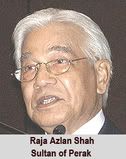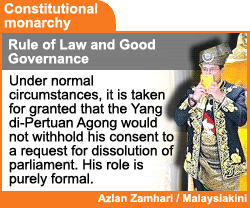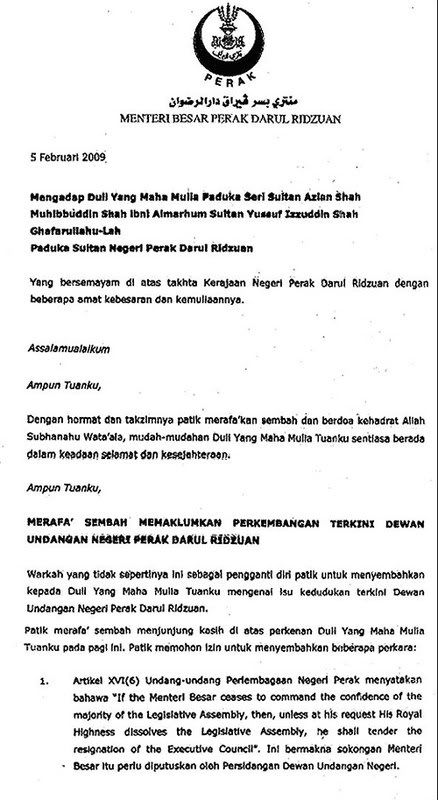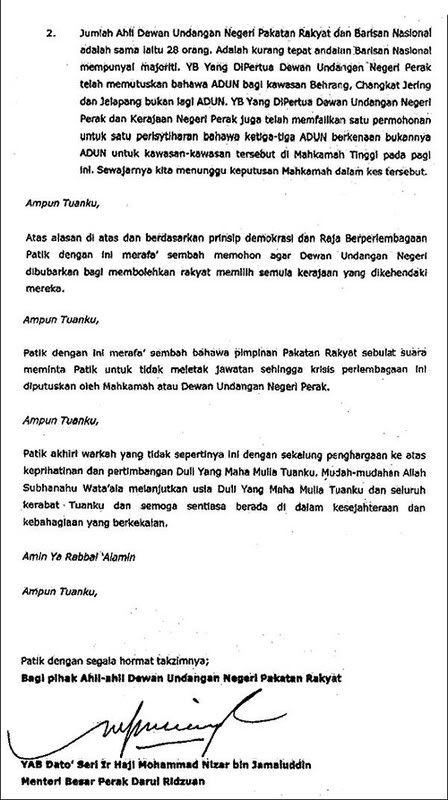Rumours are swirling in the blogosphere, in internet chat-rooms, in coffee-stalls and in offices around the country on the latest turn of events in Perak.
- End of Up-date
Read here and here for more in Malaysiakini

Mohd Nizar said that the sultan should have accepted his request for the assembly to be dissolved. He said the sultan should follow the advice of the Menteri Besar as leader of the house, to dissolve the assembly.The country is deeply divide over the Perak Sultan's decision to impose his will on the Perak rakyat to install a BN-Government as a result of the controversial defections of 3 state representatives who are known as "BN-friendly" Independents.
The Perak Palace's decision causing an impasse is developing into a constitutional crisis, constitutional experts say.
Veteran UMNO MP (Gua Musang)Tengku Razaleigh says:The burning issue being raised by Malaysians on the Perak Sultan Raja Azlan Shah's decision is this:"Acording to the Constitution, Dato’ Seri Nizar Jamaluddin is Menteri Besar until he resigns of his own accord, or is removed by a vote of no-confidence in a formal sitting of the assembly. The Constitution makes NO provision for his removal by any other means,including by petitions or instructions from any other authority." (read more below)
The right of the Sultan to remove the MB is not being questioned. It is whether the Sultan was constitutionally right, under our system of constitutional monarchy, to deny the request of the Leader of the State Assembly made to the monarch for a dissolution of the Assembly, given the prevailing circumstances. And whether the Sultan's option he had chosen to address the political crisis would be less divisive and is in the best interest of the people of Perak who, themselves, had voiced their rights less than a year ago in a general election.
This is in accordance to a guidebook that the Perak Sultan himself had written on the monarchy:
"Under normal circumstances, it is taken for granted that the Yang di-Pertuan Agong would not withhold his consent to a request for dissolution of parliament. His role is purely formal."

(Image courtesy of Malaysiakini)
Sultan Azlan Shah wrote in " Constitutional Monarchy, Rule of Law and Good Governance" in 2004 that no sultan or agung had withheld consent to dissolve legislative body, except in Kelantan in 1977.
Mohd Nizar told a press conference:
Mohd Nizar was angry the state secretary Abdul Rahman Hashim told him that he was no longer the menteri besar."I was asked by the Perak sultan to resign but I told him I did not intend to do so. I apologise for rejecting the decision of the sultan.
We are just pleading for the proper process to be followed.
The (Perak) state constitution said the support for menteri besar must be decided by the State Assembly. I appealed to the sultan to adhere to what is stipulated in Perak Constitution, that the sultan must allow the State Assembly to decide so that a vote of no confidence is done. That is best way.
I explained to his majesty that following a guidebook that the Perak sultan had written on the monarchy, the sultan should follow my advice as leader of the house to dissolve the assembly, ie under normal circumstances, it is taken for granted that the Yang di-Pertuan Agong would not withhold his consent to a request for dissolution of parliament. His role is purely formal.
We are still in government. We have not dissolved (the assembly).
It is wrong for BN to assume (it has a) majority. I have told this to sultan that we have SAME number of members and there is NO majority. So, on that basis I appealed to sultan for dissolution.We should wait for the court decision on that matter. If the court application (by Pakatan) was successful, the BN will not have a majority."
He also asked the people to be patient and understand the issue at hand." I had a word with him a moment ago and he said that he was in full command of the state secretariat and that I am no longer the menteri besar... and that there is no menteri besar now.
Under what prerogative is he doing that?As far as we are concerned, we are still the legitimate government of the people.
The BN's majority may not be a valid one. Let the people determine on who they want as their representatives.
If BN wins, we will accept it willingly. "
Mohd Nizar also wrote a letter to the sultan to explain his reasons not to resign as menteri besar. (see below)
Anwar Ibrahim and PAS leader Haji Hadi Abdul Awang
Pakatan leader Anwar Ibrahim rejected talks that the Mohd Nizar's actions were acts of defiance against the sultan. He also said that if the BN takeover was allowed, it would bring destruction of democratic system in the country. Anwar also said that the Pakatan leaders would like to meet the sultan to explain to him their stand on this matter.
Meanwhile, PAS leader Abdul Hadi Awang said that the menteri besar would NOT resign unless a Special State Assembly session was called OR fresh elections held. "We also hope the people would remain calm and not break the law," he said at the press conference.
According to experts, the impasse is now turning into a constitutional crisis.
Former UN special rapporteur for judicial independence Param Cumaraswamy said it would be extremely difficult for either of the two sides to rule effectively in Perak. He said "A constitutional crisis is brewing."
But analysts have warned Perak could be an empty victory for Barisan Nasional because voters could see the move as undemocratic and more of the old-style dirty politics that were rejected at the ballot box last year.
Related Article
A Shameful Scene is Unfolding in Perak.
by
Y.M. Tengku Razaleigh
Read here for more
"Let me follow up on what I said earlier about the status of the Chief Minister.
The Constitution is the highest law of the land. It is the foundation and source of legal authority, and the Rulers are sworn to protect and uphold it.
Acording to the Constitution, Dato’ Seri Nizar Jamaluddin is Menteri Besar until he resigns of his own accord, or is removed by a vote of no-confidence in a formal sitting of the assembly. The Constitution makes no provision for his removal by any other means, including by petitions or instructions from any other authority.
Two principles need clarifying in the light of today’s events:
- First, the government of the day is established according to rules and principles codified in the Constitution. This is the difference between legitimately formed government and tyranny, which is rule by the law of the jungle.
- Second, legitimate constitutional government draws all its authority from the consent of the PEOPLE and ONLY from that consent. The people consent because it is their government formed according to their constitution, whose leaders they have chosen through free and fair elections.
We need to test that consent periodically. At key points such as when governments are to be formed or to be dissolved, the Constitution provides for formal, definitive tests to find out how much of the people’s ‘consent’, or support, a government really has.
So we conduct elections to test how much support a candidate for leadership has among the people. The question is posed in elections governed by rules and oversight agreed ahead of time.If those elections are not held, or if there is some doubt that they are free and fair, then the question of legitimate leadership is not determined.
It doesn’t matter how many men with flaming torches march chanting your name in the middle of the night. You need to prove you have the support of voters in a free and fair election.
Similarly, the Constitution provides for a definitive way to test if the Chief Minister or the Prime Minister commands a majority in the dewan or in Parliament, as the case may be.We put the question to a vote of confidence on the floor of the Dewan.
Only the answer of the ASSEMBLY counts. It doesn’t matter how many sworn statements, defections, press conferences, and declarations you have, nor what forms of advertisement, display, inducement or force you bring to bear on the question.
These are the ONLY tests that count in our constitutional democracy.
To formally test the mandate of the current government, whether in Perak, Sabah or the Federal government, the question must either be put to the people through state elections, or to the assemblymen through a formal vote in the dewan.
This is what it means to be a parliamentary democracy.To remove and install governments in any other way is to violate the Constitution, erode the rule of law, and to run the risk of forming an illegal government.
Legitimate authority can only be established through the democratic means spelled out in our constitution. Rightful authority is an entirely different thing from the brute power that can be bought, sold or seized by force.The invisible laws make our government, nation and society possible.
I won’t begin to describe the harm we would do these things if we began to ratify power achieved without regard for the rule of law in this country."


No comments:
Post a Comment